
AAPS Journal
Scope & Guideline
Catalyzing Progress in the World of Pharmaceutics.
Introduction
Aims and Scopes
- Pharmacokinetics and Pharmacodynamics:
Research related to the absorption, distribution, metabolism, and excretion (ADME) of drugs, including modeling approaches to predict pharmacokinetic behavior in various populations. - Drug Delivery Systems:
Studies focused on novel drug delivery mechanisms, including nanotechnology, liposomes, and other innovative formulations aimed at improving therapeutic efficacy and patient compliance. - Biopharmaceutics and Drug Formulation:
Exploration of drug formulation strategies, dissolution testing, and the impact of physicochemical properties on drug absorption and bioavailability. - Regulatory Science and Compliance:
Research that informs regulatory practices, including bioanalytical method validation, immunogenicity assessment, and guidance for generic drug development. - Translational Medicine and Therapeutics:
Work that bridges preclinical studies to clinical applications, emphasizing model-informed drug development and the assessment of therapeutic efficacy. - Immunogenicity and Biologics:
Studies on the immunogenicity of therapeutic proteins and monoclonal antibodies, including the development of assays for anti-drug antibodies.
Trending and Emerging
- Physiologically Based Pharmacokinetic (PBPK) Modeling:
There is a significant increase in studies utilizing PBPK modeling to predict drug behavior across various populations, including pediatrics and specific patient groups, highlighting the trend towards individualized medicine. - Nanotechnology in Drug Delivery:
Research on nanocarriers and nanomedicine is rapidly expanding, focusing on their applications in targeted delivery and enhanced therapeutic profiles, particularly in oncology and chronic diseases. - Regulatory Science Innovations:
Emerging themes in regulatory science, including comprehensive assessments of immunogenicity and biosimilar development, are becoming increasingly relevant as the pharmaceutical landscape evolves. - Model-Informed Drug Development:
An uptick in the use of model-informed approaches to streamline drug development processes is evident, emphasizing the importance of integrating data-driven strategies to enhance decision-making. - Integrated Multi-Disciplinary Approaches:
Studies that combine pharmacology, toxicology, and biopharmaceutics to address complex drug development challenges are on the rise, reflecting a holistic view of drug therapy. - Advanced Drug Formulation Techniques:
Innovative formulation strategies, including the use of biodegradable polymers and smart drug delivery systems, are gaining prominence as researchers seek to improve drug solubility and stability.
Declining or Waning
- Traditional Pharmacokinetic Models:
There appears to be a waning interest in classical pharmacokinetic models that do not incorporate complex systems or population variability, as newer, more sophisticated modeling approaches gain traction. - Basic Drug Formulation Techniques:
Research specifically focused on conventional formulation techniques is becoming less prominent, likely overshadowed by more advanced strategies such as nanotechnology and targeted delivery systems. - In Vitro Testing without Translational Evidence:
Studies that solely rely on in vitro testing without robust translational frameworks or clinical correlation are less frequently published, as the emphasis shifts toward more integrative approaches. - Single-Drug Focus Studies:
Investigations centered around single-drug interactions are declining in favor of multifactorial studies that consider drug combinations and their interactions in complex biological systems.
Similar Journals

Istanbul Journal of Pharmacy
Uniting scholars to elevate pharmaceutical discourse.Istanbul Journal of Pharmacy, published by Istanbul University, Faculty of Pharmacy, is a pivotal platform dedicated to the advancement of pharmaceutical sciences and technology. This journal serves as a vital resource for researchers, professionals, and students alike, seeking to disseminate cutting-edge research, reviews, and innovative methodologies within the pharmaceutical discipline. With a commitment to open access, the journal aims to foster a collaborative environment that promotes information sharing and scholarly discourse. The Istanbul Journal of Pharmacy invites submissions that delve into diverse topics ranging from drug formulation to pharmacokinetics, ensuring that readers are equipped with the latest insights and discoveries in the field. This journal is positioned to enhance scientific communication within the pharmaceutical community and support the continuous evolution of pharmacy practice and education globally.
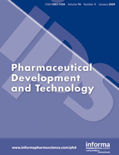
PHARMACEUTICAL DEVELOPMENT AND TECHNOLOGY
Pioneering Breakthroughs in Drug Development and Delivery.PHARMACEUTICAL DEVELOPMENT AND TECHNOLOGY is a premier journal published by Taylor & Francis Ltd that focuses on the latest advancements and innovations in the field of pharmaceutical science. Established in 1996, this journal has evolved to encompass a wide array of interdisciplinary studies relevant to drug development, formulation technology, and delivery systems, serving as a platform for researchers and professionals to share groundbreaking findings. With an impressive impact factor and ranked in both Q2 in Pharmaceutical Science and Q3 in Medicine (miscellaneous), it positions itself among the top-tier journals in pharmacology and toxicology. The journal's insights are critical for scholars and practitioners aiming to enhance therapeutic efficacy and safety. Access options for the content remain traditional, thus supporting a comprehensive approach to scientific literature. Throughout its converged years up to 2024, PHARMACEUTICAL DEVELOPMENT AND TECHNOLOGY continues to play a vital role in shaping pharmaceutical education and practice.
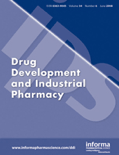
DRUG DEVELOPMENT AND INDUSTRIAL PHARMACY
Innovating Solutions for Modern Pharmaceutical ChallengesDrug Development and Industrial Pharmacy is a prestigious journal published by Taylor & Francis Ltd, focusing on the critical field of pharmaceutical sciences. With an ISSN of 0363-9045 and an E-ISSN of 1520-5762, the journal has been an essential resource for researchers and professionals since its inception in 1974. It occupies a crucial niche within Drug Discovery, Organic Chemistry, and Pharmaceutical Science, currently ranked in the second and third quartiles, reflecting its solid contribution to the field. The journal encompasses a wide array of topics, including drug development processes, formulation, and industrial manufacturing alongside cutting-edge research in pharmacology and toxicology. With a commendable Scopus ranking demonstrating high relevance—ranked #44 in Pharmaceutical Science—it serves as a vital forum for academia and industry to share innovative findings and methodologies. While it does not offer open access, the journal remains an invaluable resource for those seeking to advance their knowledge and enhance their research in pharmaceutical development.
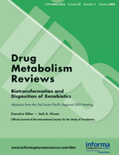
DRUG METABOLISM REVIEWS
Exploring the intricacies of drug metabolism.Drug Metabolism Reviews is a premier journal dedicated to the dissemination of scientific research and reviews in the field of pharmacology, toxicology, and pharmaceutics, published by Taylor & Francis Ltd. With its inception dating back to 1972, this journal has consistently provided an authoritative platform for scholars and professionals from diverse disciplines to explore the intricate mechanisms of drug metabolism and their implications for therapeutic applications. The journal enjoys commendable rankings, placing in the Q2 quartile for Pharmacology (medical) and the Q1 quartile in the miscellaneous subfield, signaling its significant impact within the community. Notably, it is recognized within the top 96th percentile in General Pharmacology, Toxicology and Pharmaceutics, affirming its esteemed position among academic publications. Although it operates under a subscription model, Drug Metabolism Reviews remains an essential resource for researchers, professionals, and students seeking to deepen their understanding of drug interactions, safety, and efficacy. The insights shared within its pages contribute vital knowledge to the global discourse on drug development and personalized medicine.

Advanced Pharmaceutical Bulletin
Catalyzing Collaboration in Cutting-edge Pharmaceutical ResearchAdvanced Pharmaceutical Bulletin, an esteemed journal published by Tabriz University of Medical Sciences & Health Services, serves as a pivotal platform for disseminating groundbreaking research in the field of pharmaceutical sciences. Since its inception in 2011, this open-access journal has dedicated itself to advancing knowledge in pharmacology, toxicology, and pharmaceutics, boasting an impressive Q1 ranking in miscellaneous categories and Q2 in pharmaceutical science as of 2023. The journal is noted for its rigorous peer-review process, ensuring that published work meets the highest standards of scientific inquiry. With notable rankings, including 7th out of 80 in general pharmacology and toxicology, it sits in the 91st percentile, highlighting its significance in the research community. Researchers and practitioners alike can access cutting-edge findings and innovative methodologies, promoting collaboration and knowledge within the scientific community. Based in Tabriz, Iran, the journal remains committed to fostering research excellence, making it an invaluable resource for scholars and professionals eager to contribute to the dynamic field of pharmaceuticals.

Pharmaceutics
Fostering collaboration in the world of pharmaceutical sciences.Pharmaceutics is a prestigious journal published by MDPI, specializing in the field of pharmaceutical sciences. With its Open Access model established in 2010, it promotes the dissemination of cutting-edge research, catering to a global audience of researchers, professionals, and students alike. Based in Switzerland, the journal has rapidly gained recognition, currently holding an impressive Q1 ranking in the pharmaceutical science category for 2023 and achieving a Scopus ranking of #32 out of 183 in the domain of Pharmacology, Toxicology, and Pharmaceutics, placing it in the 82nd percentile. The journal's objectives include advancing knowledge in drug formulation, delivery systems, and therapeutic applications, ensuring that published works contribute significantly to both academic discourse and practical applications in the pharmaceutical industry. As part of its commitment to excellence, Pharmaceutics welcomes high-quality manuscripts that inspire innovation and foster collaboration in this vital field.
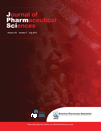
JOURNAL OF PHARMACEUTICAL SCIENCES
Advancing pharmaceutical knowledge, shaping future innovations.The JOURNAL OF PHARMACEUTICAL SCIENCES, published by ELSEVIER SCIENCE INC, stands as a cornerstone in the field of pharmaceutical sciences, offering a platform for innovative research and advancements since its inception in 1961. With an impressive Scopus Rank of #36 out of 183 in the Pharmaceutical Science category, this journal is recognized for its commitment to disseminating high-quality, peer-reviewed studies that significantly contribute to the realms of pharmacology, toxicology, and pharmaceutics. Holding a 2023 Q2 category quartile, it attracts a diverse readership encompassing researchers, industry professionals, and students eager to advance their understanding and expertise. While the journal is not open access, it ensures valuable insights in every issue, making it an essential resource for those dedicated to the evolving landscape of pharmaceutical research. With an impact factor that reflects its relevance and influence, the JOURNAL OF PHARMACEUTICAL SCIENCES continues to shape the discourse in its domain, fostering innovation and collaboration among scholars worldwide.

ADMET and DMPK
Fostering collaboration in the evolving landscape of medicinal chemistry.ADMET and DMPK is a premier open-access journal published by IAPC PUBLISHING since 2013, focusing on the rapidly evolving fields of ADMET (Absorption, Distribution, Metabolism, Excretion, and Toxicity) and DMPK (Drug Metabolism and Pharmacokinetics). Catering to researchers, professionals, and students in the realms of pharmacology, toxicology, and medicinal chemistry, this journal plays a crucial role in fostering innovation and collaboration within the interdisciplinary landscape of drug development. With an impressive Q1 ranking in Pharmacology, Toxicology and Pharmaceutics and ranking in the top percentiles across various categories such as Chemistry and Health, ADMET and DMPK provides a reputable platform for high-quality publications. Its global reach, complemented by its open-access model, ensures that valuable research is accessible to a wide audience. As we converge towards 2024, this journal remains dedicated to advancing knowledge and practices that shape the future of drug discovery and safety, making it an essential resource in the scientific community.

Ars Pharmaceutica
Advancing pharmaceutical knowledge through open dialogue.Ars Pharmaceutica is a distinguished open-access journal published by UNIV GRANADA, EDITORIAL, that has been at the forefront of pharmaceutical sciences since its establishment. With ISSN 0004-2927 and E-ISSN 2340-9894, this journal aims to disseminate high-quality research in pharmacology, toxicology, and pharmaceutics, contributing to the advancement of the field. With a historical scope that spans from 1980 to 2017, it has played a pivotal role in shaping the discourse surrounding pharmaceutical science and its intersection with the arts and humanities. Although currently ranked within the 13th percentile in Scopus for Pharmaceutical Science and the 11th percentile for History and Philosophy of Science, Ars Pharmaceutica continues to uphold its commitment to academic excellence and innovation. By providing a platform for open-access research, it encourages collaboration and knowledge sharing among researchers, professionals, and students, thus enhancing the broader understanding of pharmaceutical developments and their societal implications.
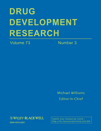
DRUG DEVELOPMENT RESEARCH
Unveiling breakthroughs in drug development for a healthier tomorrow.DRUG DEVELOPMENT RESEARCH is a premier interdisciplinary journal published by Wiley, focusing on the latest advancements in drug discovery, pharmacology, and toxicology. With an ISSN of 0272-4391 and an E-ISSN of 1098-2299, this esteemed publication has been a cornerstone in the field since its inception in 1981 and continues to provide cutting-edge research until 2024. Its rigorous peer-review process and strategic placement in Q2 of the Drug Discovery category, as well as ranking #60 out of 157 in Scopus, underscore the journal's relevance and influence, boasting a respectable 62nd percentile ranking. While the journal does not currently offer open access, it remains a vital resource for researchers, professionals, and students seeking to expand their knowledge on the processes of drug development, identifying new therapeutic targets, and assessing the efficacy and safety of novel compounds. Situated in Hoboken, NJ, this journal stands at the forefront of pharmaceutical innovation, making significant contributions to the advancement of medical science.